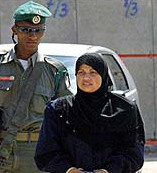Palestinian Center for Human Rights 13 August 2003

Intisar Ajouri (right)
Intisar and Kifah Ajouri were transferred to the Gaza Strip in September 2002 in accordance with an Israeli military order which provided for a two-year period of “assigned residence” to the Gaza Strip. The military order was issued on the basis that the Ajouris’ presence in the West Bank posed a security threat to Israel. The military order provided for six monthly reviews of the order throughout the two year period to determine the ongoing existence of the security threat posed by the Ajouris. PCHR considers this military order in violation of international human rights and humanitarian law, specifically the Fourth Geneva Convention which prohibits the forcible transfer of protected persons within Occupied Territory.
In the first six month review, the Military Appeals Committee concluded on 27 February 2003 that the Ajouris were still considered a threat to security and therefore could not be returned to the West Bank.
Intissar and Kifah ‘Ajouri, represented by Yossi Wolfson, an attorney with the Center for the Defense of the Individual in Israel (HAMOKED) and PCHR lawyer, Ibrahim Sourani, were present at Sunday’s session in the Erez Military courts. The Ajouri’s lawyers argued for the cancellation of the military order and for the Ajouris to be returned to Nablus. Argumentation was based on the increasingly dire economic situation faced by Intisar and Kifah during their first year period of assigned residence and on the continuing lack of evidence to substantiate the Military Prosecutors claims that the Ajouris have posed or continue to pose a security threat to Israel.
During Sunday’s session, the Israeli Military Prosecutor requested that the military order remain in force and that it be reconsidered at the next six month review which is scheduled for February 2004; 18 months from the date of issue. The Military Prosecutor claimed that according to “secret evidence,” the two continued to pose a serious threat to “Israel’s security”. It was also argued that the Ajouris are continuing to receive financial assistance from parties that were described by the Military Prosecutor as an “enemy” group. No identification of such a group was made and no evidence was presented publicly to support this claim, or the continued threat posed by the Ajouris. The Committee suspended the session for 20 minutes in order to hold a closed session to review the evidence presented by the Military Prosecutor. As has characterized this case since its beginning in August 2002, the defense were not permitted any access to the information presented as evidence of the security threat posed by the Ajouris.
PCHR condemns the unlawful transfer of Intisar and Kifah Ajouri by the Israeli occupying forces, including as part of the policy of collective punishment against families of Palestinians whom Israel claims to have facilitated, ordered or carried out attacks against Israeli targets. PCHR reiterates its call to the international community to intervene to bring an end to the ongoing violations of international human rights and humanitarian law, including war crimes, perpetrated by the Israeli occupying forces against Palestinian civilians.